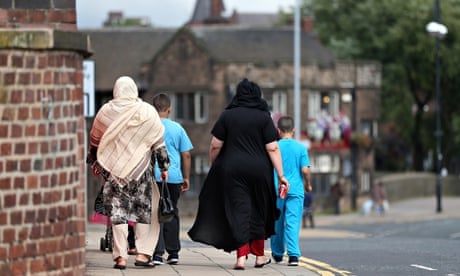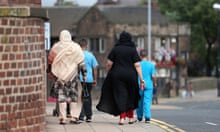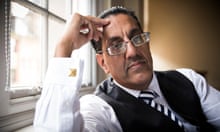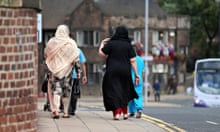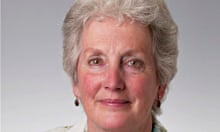More women should be appointed to the highest levels of Britain's Islamic organisations to help prevent repetition of the child sex abuse scandal in Rotherham, according to senior Muslim figures.
Last week a report by Professor Alexis Jay into grooming within the South Yorkshire town pinpointed a "macho culture" in the town as a factor in perpetuating the abuse, which involved 1,400 cases of child sexual exploitation between 1997 and 2013.
Critics say the traditional male-heavy hierarchy of Muslim groups contributed to the community's silence on abuse and the culture of disbelief that meant many victims were not listened to. Jay's report found the abuse continued partly because of "blatant" failures by council and police, among them the habit of talking only to older male Muslim community representatives, which meant the true extent of the problem was obscured.
The hope now among many influential male and female Muslim figures is that the fallout of the Jay report will serve as a wake-up call in confronting the male dominance of many British mosques.
Sara Khan, director of women's human rights group Inspire, which has been working closely with Muslim organisations and groups such as the Everyday Sexism Project, criticised the traditional hierarchies that still govern many Muslim organisations.
"In terms of dealing with issues around grooming, around violence," she said, "you fundamentally need far more women representation. The fact that these girls weren't believed demonstrates a culture of disbelief that I think comes from a male perspective.
"The men did not want to believe or chose not to believe the victims, whether the victims were Asian or whether they were white."
Ibrahim Mogra, assistant secretary general of the Muslim Council of Britain, the country's largest Muslim organisation and umbrella body for 500 mosques, schools and associations, conceded that allowing more women to occupy senior positions would offer a more "compassionate" response to similar allegations in the future.
He said: "Having a better representation of genders would be something that I believe would help. It is absolutely crucial for us to tap into that huge resource and untapped asset that we have within our communities to improve them.
"There are certain situations and scenarios where one [gender] can be more effective than the other. Some situations may require more compassion and empathy – perhaps one gender might not be able to fully display those characteristics; therefore a partnership is the most effective formula."
Khan added it was critical to confront what she described as "self-appointed, often undemocratically appointed community leaders" in the wake of the Rotherham report.
"It's about control, power, authority and they will do all they can to maintain that. Whenever a woman has tried to break out of that structure, often those community leaders will do much to silence them. It's incredibly important to get the women's voices in there, to address that patriarchy."
The Rotherham report also quotes a home affairs select committee finding that cases of Asian men grooming Asian girls did not surface because victims faced being ostracised "by the whole community" if they went public with their allegations.
Other high-profile Muslim women backing calls for change are understood to include Lady Warsi, the former Conservative party co-chairman, who recently quit the government over its Gaza policy, although she is keen to ensure that such steps go beyond mere "window dressing".
Julie Siddiqi, of the Islamic Society of Britain, described the existence of Muslim community meetings that continue to be exclusively male as "unacceptable" and, in some cases, an obstruction to justice. Siddiqi said these traditional community groups had such a restricted reach that they were of limited help to police investigating allegations involving the local Muslim community.
"If all these mosques are committees of men it's obviously not diverse," she said. "We need younger [people], more women, different backgrounds. In some areas I think it will have definitely played a role [in perpetuating the abuse] because the local authority and police don't have links with the right kind of people and they just talk – or in some cases they haven't even been speaking – to the same old people, and that causes a problem.
"Men and women just have to work together. The culture in some of these organisations is prejudiced against women, there's no doubt about that."
